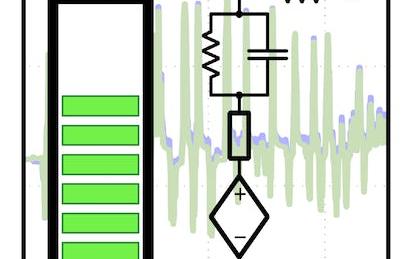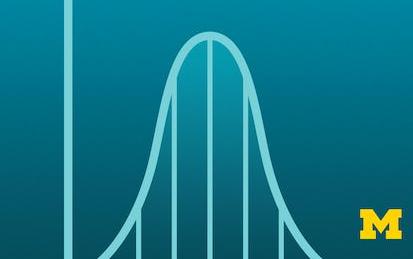

دوراتنا

Business Statistics and Analysis
The Business Statistics and Analysis Specialization is designed to equip you with a basic understanding of business data analysis tools and techniques. Informed by our world-class Data Science master's and PhD course material, you’ll master essential spreadsheet functions, build descriptive business data measures, and develop your aptitude for data modeling. You’ll also explore basic probability concepts, including measuring and modeling uncertainty, and you’ll use various data distributions, along with the Linear Regression Model, to analyze and inform business decisions.
-
Course by

-
 Self Paced
Self Paced
-
 الإنجليزية
الإنجليزية

Pre-MBA Statistics
Welcome to the Pre-MBA Statistics course! By the end of this course, you will be able to describe how statistics can be used to summarize, analyze, and interpret data. This course introduces you to some aspects of descriptive and inferential statistics. You will learn to distinguish between various data types and describe the operations that you can execute with each type of data and the right tools to use. The course also discusses the concepts of probability, which form the backbone of statistical analysis.
-
Course by

-
 Self Paced
Self Paced
-
 24 ساعات
24 ساعات
-
 الإنجليزية
الإنجليزية

TensorFlow 2 for Deep Learning
This Specialization is intended for machine learning researchers and practitioners who are seeking to develop practical skills in the popular deep learning framework TensorFlow. The first course of this Specialization will guide you through the fundamental concepts required to successfully build, train, evaluate and make predictions from deep learning models, validating your models and including regularisation, implementing callbacks, and saving and loading models. The second course will deepen your knowledge and skills with TensorFlow, in order to develop fully customised deep learning mode
-
Course by

-
 Self Paced
Self Paced
-
 الإنجليزية
الإنجليزية

Sports Performance Analytics
Sports analytics has emerged as a field of research with increasing popularity propelled, in part, by the real-world success illustrated by the best-selling book and motion picture, Moneyball.
-
Course by

-
 الإنجليزية
الإنجليزية

Introduction to Risk Management
What is risk? Why do firms manage risk? In this course, you will be introduced to the different types of business and financial risks, their sources, and best practice methods for measuring risk. This course will help you gauge different risk types and set risk limits, describe the key factors that drive each type of risk, and identify the steps needed to choose probability distributions to estimate risk. You will explore the history and development of risk management as a science, and financial and business trends that have shaped the practice of risk management.
-
Course by

-
 Self Paced
Self Paced
-
 16 ساعات
16 ساعات
-
 الإنجليزية
الإنجليزية

Bayesian Statistics: From Concept to Data Analysis
This course introduces the Bayesian approach to statistics, starting with the concept of probability and moving to the analysis of data. We will learn about the philosophy of the Bayesian approach as well as how to implement it for common types of data. We will compare the Bayesian approach to the more commonly-taught Frequentist approach, and see some of the benefits of the Bayesian approach. In particular, the Bayesian approach allows for better accounting of uncertainty, results that have more intuitive and interpretable meaning, and more explicit statements of assumptions.
-
Course by

-
 Self Paced
Self Paced
-
 12 ساعات
12 ساعات
-
 الإنجليزية
الإنجليزية

State Estimation and Localization for Self-Driving Cars
Welcome to State Estimation and Localization for Self-Driving Cars, the second course in University of Toronto’s Self-Driving Cars Specialization. We recommend you take the first course in the Specialization prior to taking this course. This course will introduce you to the different sensors and how we can use them for state estimation and localization in a self-driving car.
-
Course by

-
 Self Paced
Self Paced
-
 27 ساعات
27 ساعات
-
 الإنجليزية
الإنجليزية

Bayesian Statistics: Mixture Models
Bayesian Statistics: Mixture Models introduces you to an important class of statistical models. The course is organized in five modules, each of which contains lecture videos, short quizzes, background reading, discussion prompts, and one or more peer-reviewed assignments. Statistics is best learned by doing it, not just watching a video, so the course is structured to help you learn through application. Some exercises require the use of R, a freely-available statistical software package.
-
Course by

-
 Self Paced
Self Paced
-
 22 ساعات
22 ساعات
-
 الإنجليزية
الإنجليزية

Understanding and Visualizing Data with Python
In this course, learners will be introduced to the field of statistics, including where data come from, study design, data management, and exploring and visualizing data. Learners will identify different types of data, and learn how to visualize, analyze, and interpret summaries for both univariate and multivariate data.
-
Course by

-
 Self Paced
Self Paced
-
 21 ساعات
21 ساعات
-
 الإنجليزية
الإنجليزية

Basic Statistics
Understanding statistics is essential to understand research in the social and behavioral sciences. In this course you will learn the basics of statistics; not just how to calculate them, but also how to evaluate them. This course will also prepare you for the next course in the specialization - the course Inferential Statistics. In the first part of the course we will discuss methods of descriptive statistics. You will learn what cases and variables are and how you can compute measures of central tendency (mean, median and mode) and dispersion (standard deviation and variance).
-
Course by

-
 Self Paced
Self Paced
-
 27 ساعات
27 ساعات
-
 الإنجليزية
الإنجليزية

Pricing Options with Mathematical Models
This is an introductory course on options and other financial derivatives, and their applications to risk management. We will start with defining derivatives and options, continue with discrete-time, binomial tree models, and then develop continuous-time, Brownian Motion models. A basic introduction to Stochastic, Ito Calculus will be given. The benchmark model will be the Black-Scholes-Merton pricing model, but we will also discuss more general models, such as stochastic volatility models.
-
Course by

-
 Self Paced
Self Paced
-
 69 ساعات
69 ساعات
-
 الإنجليزية
الإنجليزية

Six Sigma Advanced Define and Measure Phases
This course is for you if you are looking to dive deeper into Six Sigma or strengthen and expand your knowledge of the basic components of green belt level of Six Sigma and Lean. Six Sigma skills are widely sought by employers both nationally and internationally. These skills have been proven to help improve business processes and performance.
-
Course by

-
 Self Paced
Self Paced
-
 15 ساعات
15 ساعات
-
 الإنجليزية
الإنجليزية

Probabilistic Deep Learning with TensorFlow 2
Welcome to this course on Probabilistic Deep Learning with TensorFlow! This course builds on the foundational concepts and skills for TensorFlow taught in the first two courses in this specialisation, and focuses on the probabilistic approach to deep learning. This is an increasingly important area of deep learning that aims to quantify the noise and uncertainty that is often present in real world datasets.
-
Course by

-
 Self Paced
Self Paced
-
 53 ساعات
53 ساعات
-
 الإنجليزية
الإنجليزية

Introduction to Software Testing
After completing this course, you will have an understanding of the fundamental principles and processes of software testing. You will have actively created test cases and run them using an automated testing tool.
-
Course by

-
 Self Paced
Self Paced
-
 30 ساعات
30 ساعات
-
 الإنجليزية
الإنجليزية

A Crash Course in Causality: Inferring Causal Effects from Observational Data
We have all heard the phrase “correlation does not equal causation.” What, then, does equal causation? This course aims to answer that question and more! Over a period of 5 weeks, you will learn how causal effects are defined, what assumptions about your data and models are necessary, and how to implement and interpret some popular statistical methods. Learners will have the opportunity to apply these methods to example data in R (free statistical software environment). At the end of the course, learners should be able to: 1. Define causal effects using potential outcomes 2.
-
Course by

-
 Self Paced
Self Paced
-
 18 ساعات
18 ساعات
-
 الإنجليزية
الإنجليزية

Exploratory Data Analysis for Machine Learning
This first course in the IBM Machine Learning Professional Certificate introduces you to Machine Learning and the content of the professional certificate. In this course you will realize the importance of good, quality data.
-
Course by

-
 Self Paced
Self Paced
-
 14 ساعات
14 ساعات
-
 الإنجليزية
الإنجليزية

Improving your statistical inferences
This course aims to help you to draw better statistical inferences from empirical research. First, we will discuss how to correctly interpret p-values, effect sizes, confidence intervals, Bayes Factors, and likelihood ratios, and how these statistics answer different questions you might be interested in. Then, you will learn how to design experiments where the false positive rate is controlled, and how to decide upon the sample size for your study, for example in order to achieve high statistical power.
-
Course by

-
 Self Paced
Self Paced
-
 28 ساعات
28 ساعات
-
 الإنجليزية
الإنجليزية

Combinatorics and Probability
Counting is one of the basic mathematically related tasks we encounter on a day to day basis. The main question here is the following. If we need to count something, can we do anything better than just counting all objects one by one? Do we need to create a list of all phone numbers to ensure that there are enough phone numbers for everyone? Is there a way to tell that our algorithm will run in a reasonable time before implementing and actually running it?
-
Course by

-
 Self Paced
Self Paced
-
 24 ساعات
24 ساعات
-
 الإنجليزية
الإنجليزية

Introduction to Probability and Data with R
This course introduces you to sampling and exploring data, as well as basic probability theory and Bayes' rule. You will examine various types of sampling methods, and discuss how such methods can impact the scope of inference. A variety of exploratory data analysis techniques will be covered, including numeric summary statistics and basic data visualization. You will be guided through installing and using R and RStudio (free statistical software), and will use this software for lab exercises and a final project.
-
Course by

-
 Self Paced
Self Paced
-
 14 ساعات
14 ساعات
-
 الإنجليزية
الإنجليزية

Basic Data Descriptors, Statistical Distributions, and Application to Business Decisions
The ability to understand and apply Business Statistics is becoming increasingly important in the industry. A good understanding of Business Statistics is a requirement to make correct and relevant interpretations of data. Lack of knowledge could lead to erroneous decisions which could potentially have negative consequences for a firm. This course is designed to introduce you to Business Statistics. We begin with the notion of descriptive statistics, which is summarizing data using a few numbers.
-
Course by

-
 Self Paced
Self Paced
-
 21 ساعات
21 ساعات
-
 الإنجليزية
الإنجليزية

Introduction to Self-Driving Cars
Welcome to Introduction to Self-Driving Cars, the first course in University of Toronto’s Self-Driving Cars Specialization. This course will introduce you to the terminology, design considerations and safety assessment of self-driving cars.
-
Course by

-
 Self Paced
Self Paced
-
 35 ساعات
35 ساعات
-
 الإنجليزية
الإنجليزية



